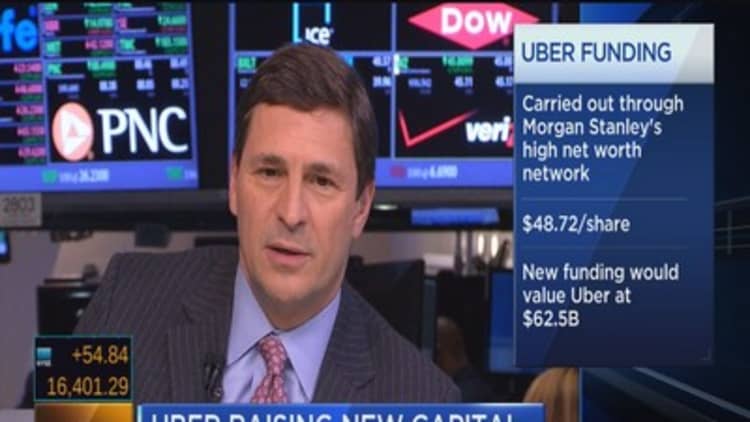In the ongoing battle between Uber and New York City, Uber has notched a win.
Mayor Bill de Blasio's office on Friday released a highly anticipated study that found Uber and competitors — referred to in the report as app-based electronic dispatch or e-dispatch services — have not significantly added to city congestion.
In addition to the impact of Uber and competitors like Lyft, the study included analysis on how congestion especially in the Central Business District, which is south of 60th Street in Manhattan, has intensified in recent years — costing drivers hours and billions.
During peak hours, vehicle commuters faced an average annual delay of 74 hours in 2014. "The annual cost of lost time due to congestion delays was approximately $14.7 billion," according to the study.
And while e-dispatch has contributed to overall congestion, it did not drive the recent increase in congestion in the Central Business District. Uber and other related trips are "substitutions" and not new trips, according to the study. "E-dispatch could drive modest growth in congestion in the future," the study found.
Increased congestion, according to the report, was attributed to freight movement, construction and population growth.
"We are pleased to release the findings of our study and look forward to continued work with the City Council and industry partners to create comprehensive proposals to address accessibility, consumer and employee safety, mobility and securing support for our public transit system," mayoral spokesman Peter Kadushin said is a statement.
"We are supportive of several of the proposals presented today, especially efforts to empower drivers by giving them more freedom to partner with companies across the industry," said Josh Mohrer, Uber New York general manager.
"We will be reviewing the policy ideas and hope to work with the de Blasio administration and the City Council on implementing many of them," said Mohrer in an email to CNBC.
Also Friday, City Council Speaker Melissa Mark-Viverito introduced legislation that would prevent Uber from facing regulations or limits on surge pricing.
Tensions during the summer last year threatened to cap the San Francisco-based start-up's growth in New York. Uber and de Blasio's office reached a deal the day before a scheduled vote in July 2015 on a bill that would have capped the growth of Uber and other for-hire-vehicle companies in one of Uber's biggest markets.
Read MoreNY Mayor de Blasio and Uber reach deal
In New York City, for-hire cars outpace yellow taxis by more than 4 to 1. The new study is likely to spark more debates over Manhattan traffic, as city officials try to get their arms around the explosive growth of smartphone-based ride-hailing companies.
As of last summer, there were roughly 13,500 yellow taxis on the road in the city — a capped number — and 63,000 for-hire vehicles, according to the Taxi & Limousine Commission.
Congestion concerns related to Uber and peers have been "knee jerk," according to one industry watcher.
"I've failed to see really clear evidence that on the whole this [ride hailing industry] has a negative impact for the stakeholders involved — consumers, entrepreneurs and the cities," said Tanner Hackett, co-founder of The On Demand Economy, a platform that focuses on the sharing economy. "The economic gains and net benefits far outweighs any impact of congestion."
If anything, city congestion could potentially decline thanks to options like "UberPool," said Jeremiah Owyang, founder of Silicon Valley-based Crowd Companies, which analyzes the sharing economy. Unlike single-passenger rides, Uber's smartphone app allows users to pool or share their ride with other passengers in the area and reduce the trip price.
"As commuters continue to adopt Uber, it will recommend fare-reduced UberPool options, reducing cost, and improving city efficiency for all," Owyang said in an email to CNBC. Uber Pool was launched in July 2015.

The study cost around $2 million and was authored by the mayor's office in consultation with consulting firm McKinsey & Co. Other contributors included Bruce Schaller, a former city transportation official.
The New York City Taxi and Limousine Commission was not immediately available for comment.
The study comes as Uber is managing a growing fleet of drivers, increased competition and high hopes from investors. Sources this week told CNBC that Uber is seeking new capital from Merrill Lynch's network of high-net worth clients, with a minimum pledge investment of $1 million. Earlier in the week, CNBC learned Uber was seeking capital from Morgan Stanley's network of high-net worth clients, in which investors could pledge a $250,000 minimum to the company. Sources said these investors would join funders previously leaked to outlets like The New York Times in December, which reported that privately owned Uber's valuation was $62.5 billion.


